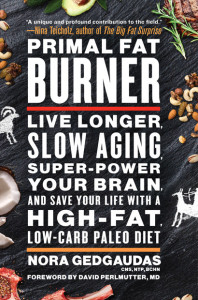Q: I have a health question about my school-girlfriend in Germany.
She’s got something happening in her legs which make walking kind of shaky and unsafe. She always needs to use a walking stick outside now. She was in the hospital for 5 days doing all kinds of tests. All blood tests came out OK.
They call it POLYNEUROPATHY and have no explanation for it. It’s supposedly age-related.
The pain gets a little better or less when taking Vitamin B6 and B12.
Do you know more about it? She and her husband are not particularly skinny and don’t eat a very healthy diet.
A: Any neuropathy is basically a state of advanced glycation—where sugars in the bloodstream combine with fats and proteins throughout the body–but especially in the nerve fibers and cause them to become sticky, misshapen and malfunction. Nerve and brain tissue are especially vulnerable to glycation because they cannot become insulin resistant. Some glycation may be reversed but much of it can’t. It is basically the primary mechanism of aging and what eventually does us in. A nerve damaged by glycation is also much more vulnerable to other free radical and antigenic (allergy-related) influences and damage.
My recommendation to her would be to undertake a complete avoidance of ALL sugar and starch (even fruit) and start a regimen of anti-glycating nutrients such as L-carnosine, R-lipoic acid, acetyl l-carnitine, benfotiamine and pyridoxamine. That’s what I would do. She will need to be very disciplined if she hopes to improve her condition. B6, B12, folic acid and other methyl donors (and B-complex in general) are always helpful to the brain and nervous tissue and help to minimize the toxic effects of homocysteine, but they are not directly anti-glycating, except for B6 (in its P-5-P form). I agree they are also a very good idea, however. For B12 she should be taking it sublingually and in a form called “methylcobalamin”. Methyl donors (along with phospholipids, fats, cholesterol and other B vitamins) are essential to the integrity of the myelin sheath—the protective insulating layer covering nerves. B12 deficiencies are common in old age because digestion, hydrochloric acid and intrinsic factor tend to be diminished. There is no question that B12 deficiency can be a contributing factor here. You need ample methyl donors for healthy nerves. B6 (P-5-P) is an important anti-glycating nutrient, especially in its fat soluble form, called “pyridoxamine”. Essential fatty acids (omega-3’s and GLA) and vitamin D are also important.
I would also HIGHLY recommend a very strict gluten free diet. There is NO question that gluten and gliadin (from grains) can have a devastating impact on the nervous system. In fact, it can be THE primary manifestation of celiac disease for many! This is very commonly overlooked by most doctors and she will have to do some homework to find a specialist knowledgeable about these issues. It might be very worthwhile for your friend to explore the possibility of celiac disease. Here in the States we have a very innovative lab, called “EnteroLab”, offering the most accurate testing for gluten sensitivity and the genetic markers that predispose to that (www.enterolab.com). Gluten sensitivity and celiac disease are essentially identical in effect and health impact. What distinguishes them from one another is a fine gray line of “genetic” manifestation. Genetic manifestation is not essential for celiac disease effects to occur, however, and diagnostic methods have traditionally been somewhat unreliable. False negatives are VERY common. Doing a salivary or blood test and having the result show as “negative” does NOT necessarily mean you don’t have the problem. If it shows “positive” in any way, shape or form you can take that to the bank—but negatives tell you ultimately very little, unfortunately. My perspective says to go by symptoms. ANY symptoms affecting gastrointestinal issues, nervous system or brain issues, mood, memory, cognitive functioning, inflammation, autoimmune issues or almost anything tell me that gluten sensitivity is a very real possibility, if not an overwhelming likelihood. I tend to just want to assume it in those cases and proceed accordingly…but many people need to see the proof in a lab test. It can take a variety of diagnostic methods to get at the truth. The gold standard is really an “elimination diet” where gluten-containing foods are simply removed from the diet and one is left to observe whether symptoms improve in time. I’m not sure what she has available there in Germany but intestinal biopsy as a “classical” diagnostic method can miss 7 out of 10 cases. The next best thing would be to test for IgA, IgG and IgM, gluten, gliadin antibodies and transglutaminase in the blood. If they have the means to test for the genetic markers for celiac disease, so much the better. Avoidance of gluten for the susceptible goes well beyond avoiding grains, though. It is in virtually ALL processed foods unless otherwise specifically labeled “gluten free”. Those vulnerable to gluten (and I would put money on this with your friend) need also to avoid gluten present even in shampoos, lotions and cosmetics (often listed as “wheat protein” or “hydrolyzed protein”). Even one crumb of gluten in a month or the tiniest bit absorbed by the skin into the system can set up an inflammatory response that can last for up to 6-8 months and have devastating consequences! Gluten sensitivity is THAT serious. Abstinence has to be 100% ALL of the time. NO exceptions. Casein sensitivity (milk protein) is a distinct possibility, also, and should always be suspected where gluten issues are present. Gluten sensitivity and celiac disease are currently epidemic.
The diet of choice here is a sugar and starch-free, gluten-free (and probably casein-free) diet with a moderate amount of complete (animal/seafood source) protein and enough quality natural fats to satisfy appetite and also meet critical essential fatty acid and fat soluble nutrient needs. Dietary fat and cholesterol become VERY important where nerve health is concerned.
We all love our indulgences and feel they are harmless–or maybe even think they are somehow good for us–until they begin to exert their cumulative toll and things start breaking down. What is happening to your friend didn’t happen “all of a sudden” but is the result of a certain way of eating and lifestyle over many, many years—even a lifetime. Eventually it catches up with you. That is what got her into the state she’s in and she’ll need to address similar mechanisms if she wants to get out of it. She has no more room for indulgences.
Neuropathy isn’t a “normal variant of aging”. It is nerve damage brought on (in simple terms) by a lifetime of sugar and starch consumption. No drug will fix it.
I hope she is able to find some improvement and relief from her condition!
~ Nora




I have peripheral arterial disease and peripheral neuropathy in my feet. I DO NOT have diabetes and am trying to find a diet for just the above. I do not think I can eat beef as my feet and legs seem to burn more when I eat that.
in response to Doris Sept. 16, 2010 on perip. neuropathy
I just now read your post, never having been on a computer before, nor did I know of this site. I also have peripheral neuropathy – suffered for years. I am almost 68 years young. I would suggest grass fed beef, Kerry Gold butter, etc., walking a LOT, which is one of the best things for the neuropathy, and taking what you can afford of the vitamins, etc. that Nora suggests. We are trying to stick with as much of the paleo way of eating as we are able to. The excitotoxins in our supermarket “food” are a contributing factor in a lot of our problems, and if we can avoid prescription drugs, all the better. Hope this helps you.
Hi Nora,
Is there any hope, dare I ask, for curing peripheral neuropathy by correcting the diet, in the ways you suggest. Im 56, and mine began with a cramping toe at 53.
After my Mom was diagnosed with cancer, when I was 55, I severely overrate carbs and sugar for one and a half months while caring for her and researching her illness, out of stress. It was then that I developed PN, it occurred very fast, within 1 month. It is very bad in the feet (complete numbness), hands (tingling), back (burning), and right leg (vibration). I’ve always over eaten carbs on and off, alternating with a paleo diet. I have Hashimotos and history of food allergy and migraine.
Thank you very much
Hi again Nora,
I forgot to mention that I feel much better on strict paleo and no grains, that I do not have Celiac, and that my migraines and low grade depression all but resolve when on the strict paleo diet.
Further, I now seem to have undiagnosed Sjrogen’s, with a borderline SJO test-the new Sjrogen’s test, dry eyes, bumps in a dry mouth, PN, hair falling out, dry scalp-although various doctors unsure as of yet.
I have had multiple tests, negative ANA, 1 on a Sed rate (highest is 20), lip (just two glands tested, instead of the required 4), and leg biopsy negative.
Im sorry to write so much, at a very low point looking for hope.
I forgot to ask -how much B6 is required? I’ve read 2mg is enough, and that too much can cause PN. I’ve taken 190mg of P5P50 for the past 5 years, some of this amount recommended by a nutritionist, the remaining in other supplements -that totaled 190 mg, Im afraid to say.
Thanks again.
Although my belief is a higher fat moderate protein diet can do wonders for many conditions there is so much information to the contrary when it comes to peripheral neuropathy (PN) in all its forms. Are there any sources of information regarding the efficacy of eating a higher fat moderate protein diet vs. the conventional wisdoms diet of ‘lean meat, fruits, vegetables and grains for PN?